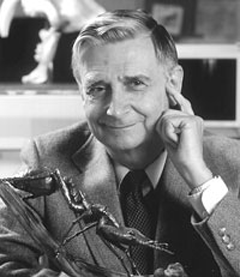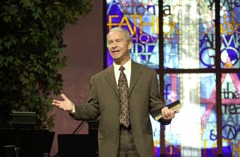The Gospel of Climate Change
Air Date: Week of January 19, 2007

Professor E.O. Wilson (Courtesy of National Parks Service)
Harvard scientists and the 30 million strong National Association of Evangelicals have joined forces and have just released an "Urgent Call to Action" to President Bush and political leaders to address global warming. Living on Earth host Bruce Gellerman speaks with Harvard biologist E.O. Wilson and Reverend Joel Hunter from Northlands Church in Orlando, Florida about the new coalition.
Transcript
GELLERMAN: Here in the U.S., the climate change is creating a climate for change, among groups that have been largely on opposite sides of the political divide. Scientists and evangelical Christians tend to have very different worldviews. But the urgent challenges posed by global warming now have some of the most eminent leaders in each camp, talking and working together to save creation.
This week they announced a coalition, a new effort to convince non-believing politicians, and the public of the need to take immediate action on climate change.
Among the leaders, Harvard biologist and Pulitzer Prize-winning author Edward O. Wilson, a deeply-committed secular scientist and the Reverend Joel Hunter, the pastor of an evangelical megachurch who last year was selected president of the Christian Coalition. They both join us from Washington. And Professor Wilson, let’s start with you. What’s the goal of this collaboration?
WILSON: The goal of collaboration is to start dialogue as they say. To make friendships, to reach mutual understanding, and to recognize the common ground of concern over the environment which effects everybody the same regardless of religious belief, political orientation, or whatever. And to recognize it together as the major, very likely, the major problem facing humanity and we quickly realized that those of us from the science side, of course it’s always been the case from the religious side, that there is a term that applies here, which is the creation. We feel that it’s the obligation of the human species to save the creation which amounts to not destroying the creation anymore than we already have been. And with that kind of common goal in mind we have discovered that we could not only find close agreement on the big issues but also that we could be friends.

Professor E.O. Wilson (Courtesy of National Parks Service)
GELLERMAN: Reverend Hunter, did scientific thinking enter your mind when you where considering this?
HUNTER: Of course. Um, Christians are, don’t just keep their heads in the Bible. We believe in two books of truth. One, God wrote the Bible and the other God wrote in creation and so scientific knowledge is very important to us. And this partnership is very important also because as it says in scripture, we have an obligation to equip the saints for service. Um, and the scientists equip us with information that they have that we don’t have and we can equip them with motivated people that can make a larger impact on society. And of course the greatest benefit to this emotionally is just the friendships that we’re making and the build up of relationships because at least for Christianity our goal is love. God is love and so this has been a happy side benefit to this whole conversation and this whole project together.
GELLERMAN: But the concept and the question and the controversy over climate change has been anything but a love fest. I mean, you know that, you had to step down as the president of the Christian Coalition or at least you chose to step down over questions of climate change.
HUNTER: That’s correct. I stepped, one of the reasons that I stepped away from being the president of the Christian Coalition is because they would not prioritize very important issues like this. But if we are to mature we have to be able to form relationships with people who have differences. And so the Christian community needs to do that in order to accomplish God’s will and I think that He kinda made it like that. I think that this is part of His continuing maturing of His people.
GELLERMAN: But could this divide the congregations themselves? I mean, you’ve got Evangelical Christians who take a position very much opposite of yours.

Reverend Joel Hunter a the Northland Church in Orlando, FL. (Courtesy of Northland)
GELLERMAN: Professor Wilson, you coined the term scientific humanist. I mean, you had a southern Baptist background. You forsake the faith for science and how do you reconcile the difference, that kind of leap of faith that religion requires and science; cold hard facts, things that are knowable, comprehendible, with something like religion which is exactly the opposite?
WILSON: I don’t see the need to agree on all the fundamental, the issues, including the most fundamental. It’s not so important where the creation comes from, where Earth’s vanishing biodiversity came from, as it is now to get together to save it. I’m a committed secularist and I’ve never budged from that position. I was, on the other hand, raised a southern Baptist in the Evangelical tradition, so I had a respect for it, for what it does for people, for the spiritual strength it gives them and for the passion with which they address moral issues. I could realize that even though I don’t believe in many of the tenets now there’s a huge area of overlap, of recognition and what needs to be done for humanity and therefore, grounds for collaboration at a time when it is most needed.
GELLERMAN: Can this issue of climate change, of the loss of biodiversity can it, has it become such an enormous issue that it perhaps is an epical issue, so immense that it forces us to set aside our fundamental differences and come together? Are we seeing something historic here?
WILSON: Sure is. Try once roughly every one hundred million years. That’s how often catastrophic losses of biodiversity of this nature have occurred. The last one was 65 million years ago, end of the age of dinosaurs and now that was pretty certainly due to a meteorite, giant meteorite strike. The present one, which we’re in the early stages of, unmistakably in the early stages of, to the extent that we could easily lose half of the species of plants and animals on Earth by the end of the century, is human caused. And you can’t reason with a meteorite but you certainly can reason with human beings that are causing it. Therefore, this becomes a major moral and practical, in addition to practical issue, and I think that the scientists have the role of producing the facts related to it and we hope the passion; the moral passion and dedication of the religious, the large majority of this country for example, can be brought to bear as well, and the combination of those two is what may be required; because religion and science are the two most powerful social forces in the world.
GELLERMAN: Well in the United States it seems Republicans and Democrats are pretty powerful forces as well. And I’m wondering, Reverend Hunter, does this change the climate of politics in this country?
HUNTER: Of course it will. Anytime there’s a major issue for the American public to face, politicians are going to have to determine how they’re going to come down on it. Um, and they’re going to have to determine how much emphasis they’re going to put on it. It’s yet to be seen exactly how that’s going to play out but this very definitely has political implications.
GELLERMAN: Professor Wilson, I want to thank you very much.
WILSON: Well thank you for having me.
GELLERMAN: And Reverend Hunter, thank you.
HUNTER: I’m honored to be on the program, especially with such an esteemed colleague.
GELLERMAN: Biologist Edward O. Wilson is a university professor at Harvard. The Reverend Joel Hunter is the senior pastor at the Northland Church in Orlando, Florida and a leader of the National Association of Evangelicals. They’re a part of a new effort to bring scientists and evangelical Christians together to educate Americans on the dangers of climate change.
Links
Evangelical Climate Initiative
Living on Earth wants to hear from you!
Living on Earth
62 Calef Highway, Suite 212
Lee, NH 03861
Telephone: 617-287-4121
E-mail: comments@loe.org
Newsletter [Click here]
Donate to Living on Earth!
Living on Earth is an independent media program and relies entirely on contributions from listeners and institutions supporting public service. Please donate now to preserve an independent environmental voice.
NewsletterLiving on Earth offers a weekly delivery of the show's rundown to your mailbox. Sign up for our newsletter today!
 Sailors For The Sea: Be the change you want to sea.
Sailors For The Sea: Be the change you want to sea.
 The Grantham Foundation for the Protection of the Environment: Committed to protecting and improving the health of the global environment.
The Grantham Foundation for the Protection of the Environment: Committed to protecting and improving the health of the global environment.
 Contribute to Living on Earth and receive, as our gift to you, an archival print of one of Mark Seth Lender's extraordinary wildlife photographs. Follow the link to see Mark's current collection of photographs.
Contribute to Living on Earth and receive, as our gift to you, an archival print of one of Mark Seth Lender's extraordinary wildlife photographs. Follow the link to see Mark's current collection of photographs.
 Buy a signed copy of Mark Seth Lender's book Smeagull the Seagull & support Living on Earth
Buy a signed copy of Mark Seth Lender's book Smeagull the Seagull & support Living on Earth

